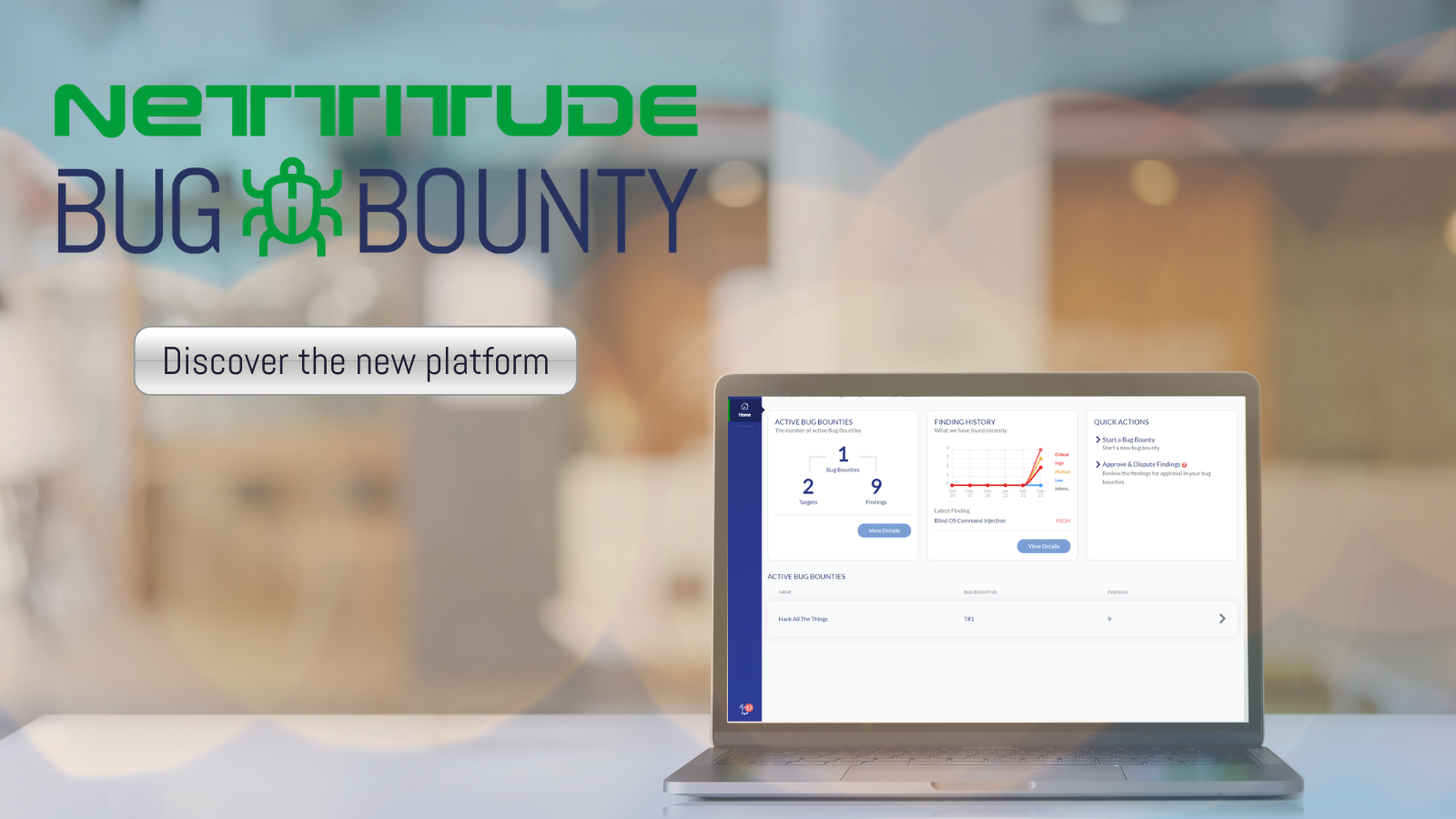By Nettitude
Today, we’re excited to announce the launch of our Nettitude Bug Bounty programme .
Over the past few months, we’ve been running a Bug Bounty trial with a number of our clients, which we’re pleased to say has been successful. Now, we’re ready to open our Bug Bounty service up to the world.
Read More
Topics:
Cyber Security,
Nettitude,
Security Blog
By Nettitude
Today, just 19% of the technology sector is represented by females. While it’s true that the industry still has a long way to go in achieving true gender equality, we are slowly and surely beginning to see change.
Nettitude can attest to this. As an organisation within the technology sector, Nettitude are proud to be one of few organisations within our industry to be led by a female CEO. Under the direction of Karen Bolton our values and vision for the future are bright when it comes to women making an impact, in which each Nettitude colleague is viewed as an important and impactful individual, despite their gender.
Read More
Topics:
Cyber Security,
Nettitude,
Security Blog
By Matt Tryphona | Security Analyst at Nettitude
The Healthcare industry remains highly targeted by hackers due to the great deal of personal data that is used and handled on a day-to-day basis. One of the biggest cyber Risks within healthcare is IoT devices, as they can be used as a gateway for capturing sensitive data if not secured correctly.
When we think of an IoT device, you may think about smart-home devices, such as a smart plug, or smart bulb controlled from an app on your phone. We may even think of a ‘smart’ assistant controlled by our voice, which can do much more than just tell you the weather. The ‘smart’ assistants can act as an IoT hub that control our devices to provide a seamless futuristic experience.
It’s one thing for the security of devices in the home to be breached, but within a healthcare environment, this can have a detrimental knock on effect across the board in light of an increasing variety and severity of healthcare cyber threats. Below we’ll take a look at what IoT is, how it’s used within the healthcare industry, and how a security breach could impact the industry.
Read More
Topics:
Cyber Security,
Nettitude,
Security Blog,
Security Testing,
Cyber Security Blog,
SEO Series
By Greg March | SOC Platform and Security Analyst at Nettitude
Technology is at the forefront of innovation with new hardware, software and AI breakthrough announcements on a daily basis. From the creation of the first computer (ENIAC developed in 1946) to the rise of IOT smart fridges, data remains the key to the interconnected world around us.
Over recent years, the rise in cyber-criminal activity has highlighted the pressures and importance of developing secure technology - whether that is for data in transit or at rest. Transport encryption such as SSL(secure Socket Layer)/TLS(Transport Layer Security) and HTTPS (Hyper Text Transfer Protocol Security) technologies are exactly that, they provide a secure method of transporting encrypted data from one machine to another, preventing unauthorized actors from stealing private information.
Although encryption was first developed with security and privacy in mind, hackers and cyber criminals of even low sophistication levels have incorporated the advantages of encryption in their attack techniques.
Read More
Topics:
Cyber Security,
Nettitude,
Security Blog,
Cyber Security Blog,
SEO Series
By Mike Buckley | Pre - Sales Consultant at Nettitude
Transforming on-premise environments to the Cloud is not new, many organisations have already been through this process, and those that haven’t or are part way through should understand their strategy for doing so. While each organisation has their own business goals, those goals will loosely align with basic architectural requirements structured within the Cloud environment, whether that be IaaS, PaaS or SaaS or a combination of all. Gartner’s “Top Security and Risk Management Trends” highlighted “Cloud Native” as one of the three architectural building blocks of Cloud security transformation, alongside “SASE” and “Zero Trust”.
Read More
Topics:
Cyber Security,
Nettitude,
Security Blog,
Cyber Security Blog,
Cloud Native Security
By Stuart Wright | Global Head of Compliance and Risk at Nettitude
Employee awareness of common security threats is a crucial line of defence when protecting your organisation from attacks. Within the retail sector, this is especially important as any security compromise could expose the payment details of thousands of customers.
For this reason, it is essential that retailers have a solid PCI DSS employee training programme in place that ensures employees know what best practice to follow to help prevent data leaks or cyber-attacks. But what should your training program look like? In this blog, we’ll try to shed some light on this and give some practical tips on how to approach this requirement.
Read More
Topics:
Cyber Security,
Nettitude,
Security Blog,
Security Testing,
Cyber Security Blog,
financial series
By Matthew Gould
As our world advances, so does technology and the demand for easier access to the services we use and depend upon throughout our daily lives. Services that are provided by you as an organisation, whom your clients put their trust in to ensure their personal and financial data is protected. Along with the ever-changing technical landscape comes the inevitable race organisations are faced with to remain up-to-date and secure. As systems increase in size and complexity, so does the strain on resources and the ability to effectively safeguard your systems and the sensitive assets they retain.
Read More
Topics:
Cyber Security,
Nettitude,
Security Blog,
Security Testing,
Cyber Security Blog,
financial series
By Tim Percival - VP of Cyber, APAC & Anthony Long - Managing Principal Security Consultant
This month, the Saudi Arabia central bank has announced plans to incorporate open banking into their financial infrastructure. This move is set bring about many new opportunities as the Kingdom changes direction from their usual path of stability. The new plans will enable increased data-sharing, allowing customers and businesses to have more control over their finances and access bespoke financial services.
With Singapore having already began to adopt open banking technology around 2016, it’s clear that Asia’s financial market is wasting no time when it comes to the latest technological advancements. Yet, with this adoption comes increased cyber-risks, rendering regulatory authorities all the more critical in stabilising the market.
In part four of the ‘Global Regulatory Frameworks Compared series, we’ll look at AASE – the cybersecurity guidelines created for the Singapore market by ABS (The Association of Banks in Singapore).
Read More
Topics:
Cyber Security,
Nettitude,
Security Blog,
Security Testing,
Cyber Security Blog,
financial series
By Tim Percival | VP of Cyber, APAC
After the recent cyber-attack on SolarWinds that exposed thousands of businesses across the world, the Singapore Monetary Authority (MAS) have stepped up measures to protect businesses in Singapore.
The new measures, which effect all financial services and e-payment firms, came into effect on Monday the 18th of January and introduce a new set of central banking rules to better mitigate technology risks. MAS have been actively working on the strengthening of cybersecurity standards for some time now, with measures including updating the MAS TRM guidelines. However, the recent breach of SolarWinds has meant that there’s new focus on implementing hardened cybersecurity measures with more emphasis on third party vendors.
Read More
Topics:
Cyber Security,
Nettitude,
Security Blog,
Security Testing,
Cyber Security Blog,
financial series
By Nettitude
Happy New Year to all of our readers of the Global Regulatory Frameworks Compared Series! As a recap, in recent months, we have been taking a deep dive into the different regulatory bodies that govern the cybersecurity requirements of the Financial Sector. One of the key issues we’ve covered is the misalignment of cybersecurity standards across the board, which in turn led to the introduction of a pan-European framework that could be leveraged across the whole of the Eurozone – TIBER EU.
While the UK and Europe have a fairly coordinated approach with the CBEST and TIBER Frameworks, Asia has a slightly different approach. In part 4 of this series, we’ll be taking a look at the iCAST Framework, governed by the Hong Kong Monetary Authority (HKMA).
Read More
Topics:
Cyber Security,
Nettitude,
Security Blog,
Security Testing,
Cyber Security Blog,
financial series










